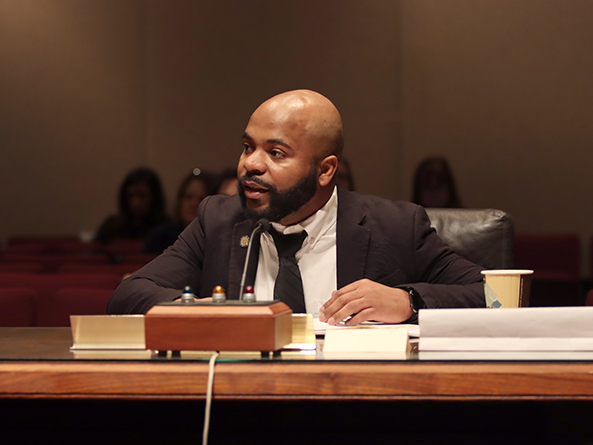Local anti-poverty plans proposed
Certain Nebraska cities would be required to create detailed poverty elimination plans in the state’s poorest communities under a proposal heard Jan. 23 by the Urban Affairs Committee.

LB840, introduced by Omaha Sen. Terrell McKinney, would create the Poverty Elimination Action Plan Act.
Beginning in July 2025, the act would require Nebraska cities with a population of at least 50,000 to adopt a five-year poverty elimination action plan, reevaluate the plan every two years and update it every five. Cities would submit the plans to the committee and the Clerk of the Legislature.
Each city’s plan would outline its goals for eliminating poverty in current high-poverty areas, qualified census tracts and economic redevelopment areas and describe its planned use of federal, state and local incentives to reach that goal.
McKinney said anti-poverty efforts by cities and nonprofits, particularly in his North Omaha district, often are “siloed” and not effectively implemented. Although the proposed plans would not in themselves eliminate poverty in Nebraska, he said, they would serve as a “crucial starting point” for taking action to address poverty’s complex underlying causes.
In addition to the plans, LB840 would require metropolitan, primary and first class cities with a population of at least 20,000 to submit a report to the committee every other year describing their efforts to eliminate poverty.
Reports would contain more than a dozen key components, including a comprehensive needs assessment, education and job training and affordable housing. The committee could request any city to present its report at a public hearing.
Tina Rockenbach testified in support of the bill on behalf of Community Action of Nebraska, saying it could address the silo effect McKinney referred to. When drawing up their plans, cities could partner with community action agencies and other nonprofits across the state that already are working to eliminate poverty, she added.
“I would hate to see a city do this from scratch … when so many of us have already done it — are doing it,” Rockenbach said.
Testifying in opposition to LB840 was Blair MacDonald on behalf of an association representing midsized Nebraska cities including Grand Island, Hastings and Kearney. The association supports the goal of eliminating poverty, she said, but its member cities lack the resources, staff and expertise to meet the bill’s requirements.
McKinney’s proposal would provide no state funding to help cities create the proposed plans, MacDonald said.
“While the concept is both worthwhile and noble,” she said, “it would be incredibly costly and difficult to implement.”
The committee took no immediate action on LB840.


